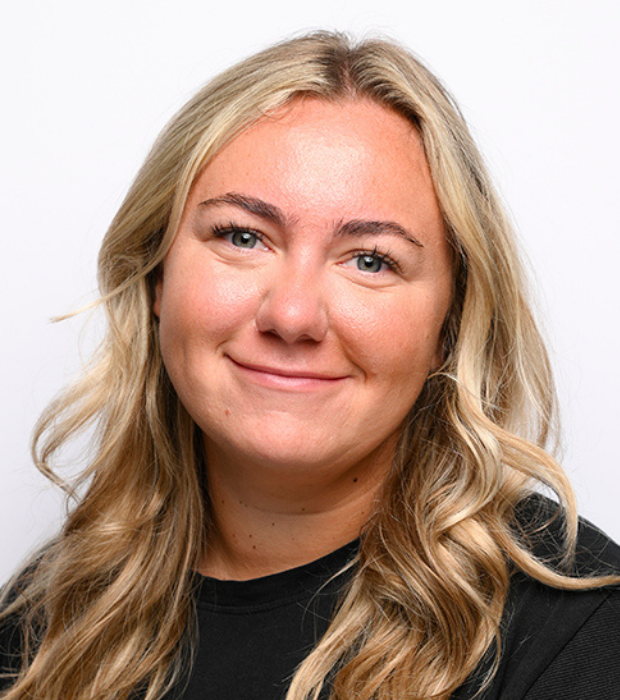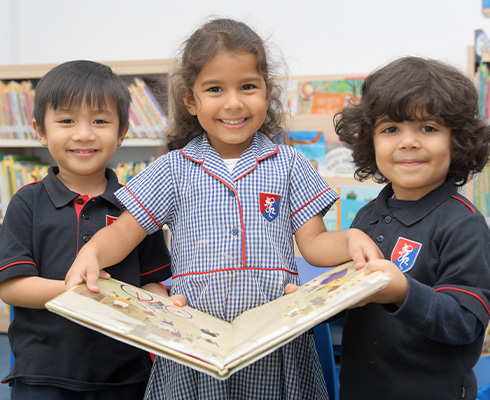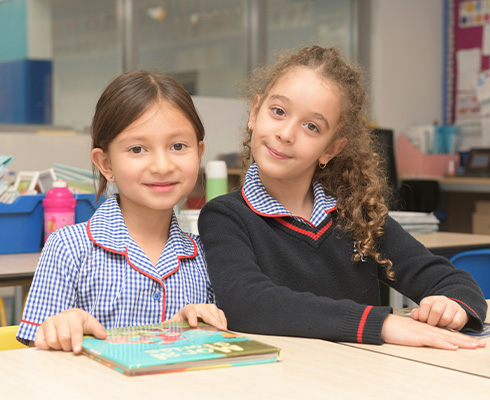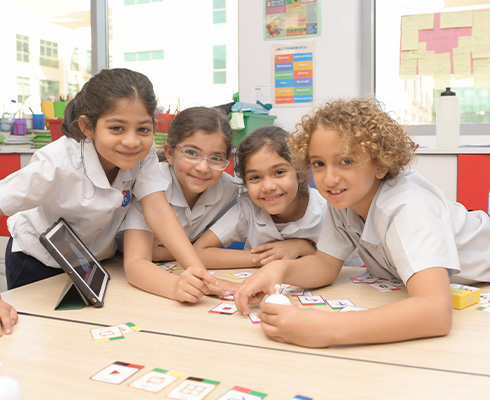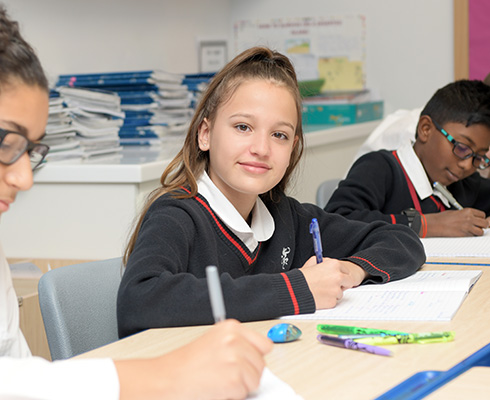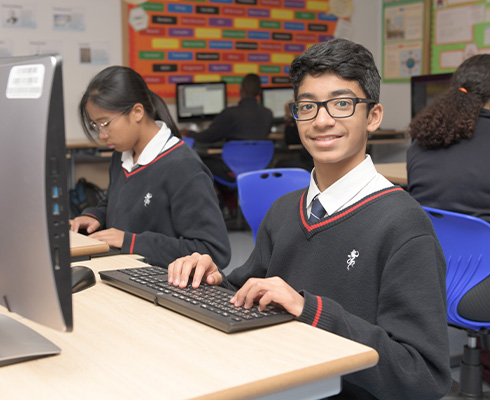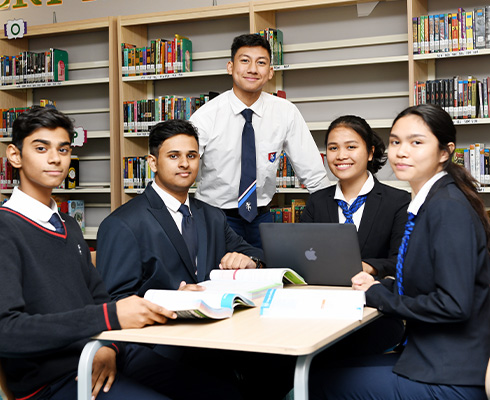Key Stage ONE Curriculum at GFS
Key Stage 1
The Key Stage One curriculum at GFS is based on the National Curriculum of England, which we adapt to our local setting from time to time. In Key Stage One, the curriculum is delivered through cross-curricular themes which create a learning experience that links curriculum areas together and allow our students to make connections in their learning. Wow starters and exciting openers engage children from the start, and the units are adapted each year to meet the needs and interests of the current children.
Explore the Key Stage One Programme
(Age: 6 years old and 7 years old)
(Year 1 and Year 2)
-
Pedagogy
In Key-Stage One (KS1), we provide a well-balanced curriculum that follows the guidance of the National Curriculum while striving to deliver a creative and engaging learning experience. A high priority is given to supporting children to become literate, numerate and independent learners, building on from the skills developing in the Foundation Stage. Continuity of routines is important to children moving from Foundation Stage 2 to Year 1, our teachers consider key principles for transition and apply practical ways to ensure this is as smooth and successful as possible. Children are supported in classrooms by Learning Assistants throughout the day. In Term One, we make sure there are elements of both play-based learning and when appropriate more formal aspects are introduced to routines. Outside learning environments offer more of a continuous provision style of learning, to support children with the familiarity of EYFS provision.
In KS1, we aim to develop confident learners who are willing to take risks and ‘have a go’. We believe we can teach our students’ brains to grow as long as we have the 'I can do it attitude'. We encourage a growth mindset through changes in attitude so that instead of saying 'I can't do it,' we say, 'I can't do it YET!’ The language of growth mindset is framed in our everyday teaching and learning so that each child understands that, through hard work and perseverance, we can learn, achieve and do things that we never thought we would ever be able to do.
The curriculum is meticulously designed, revolving around a central theme incorporating a key text, creating a rich learning experience that connects various facets of the curriculum. Past themes that have captivated students include "Around the World," "The Tiger Who Came to Tea," "Fireworks," and "Green Fingers." Through these themes, children are not just educated but genuinely engaged in their learning journey, embarking on exciting lessons and immersive experience days that make learning a vibrant and memorable adventure.
Children continue their early reading journey that begins in EYFS. They build on their phonics and de-coding abilities through a consistent approach to phonics teaching, which also uses the Oxford Reading Tree discrete phonics scheme ‘Floppy’s Phonics’. Teachers help children develop the skills to be successful readers through guided reading sessions and library visits to develop a lifelong love of reading.
Building on from the learning established in EYFS, we are committed to ensuring that all pupils achieve mastery in the key concepts of mathematics, appropriate for their age group and to facilitate this our teachers apply the Power Maths programme. Our aim is for the children to be able to confidently choose the most efficient method when solving problems or calculating the answer to a question. These lessons are structured to include the following elements; A Discover task to get children to solve a problem that aims to generate curiosity. I Do- In the first step, the teacher models the appropriate way of performing the skills included in the new concept being taught. We Do- After the teacher models the correct way to perform the new concept being taught, the class work through some examples together. You Do- This step is where students demonstrate their initial level of understanding of the new concept being taught through independent practice. This allows for a deeper level of learning to develop.
-
Course Structure
The curriculum for each year-group is further enhanced through the use of guest visitors, trips and experiences, alongside after-school clubs, to provide rich and meaningful learning experiences.
We aim to develop confident learners who are willing to take risks and ‘have a go’. We believe we can teach our students’ brains to grow as long as we have the 'I can do it attitude'. We encourage a growth mindset through changes in attitude so that instead of saying 'I can't do it', we say 'I can't do it YET! The language of growth mind-set is framed in our everyday teaching and learning where each child understands that, through hard work and perseverance, we can learn, achieve and do things that we never thought we would ever be able to do.
Our Key Stage 1 students are still discovering their skills and competencies, and at this stage they are introduced to subjects that will lay the foundation for learning as they go into higher year levels. Learning is still exciting and the learning atmosphere is stimulating.
Core Subjects
- English
- Mathematics
- Science
Other Subjects
- Computing
- Humanities (History and Geography)
- UAE Social Studies from Year 2
- Arabic (for Arabic speakers)
- Arabic (for non-Arabic speakers)
- Islamic Studies (for Muslim students)
- Moral Education from Year 2
or
- Personal, Social and Health Education (PSHE) (for non-Muslim students)
- Music
- Physical Education (PE)
- Art
-
Curriculum Maps
-
Reading
“If you are going to get anywhere in life you have to read a lot of books.”- Roald Dahl
It is our ultimate goal that all of our children develop an intrinsic love of reading and become lifelong readers and learners.
Children are taught skills such as decoding, comprehension and inference through whole class and guided reading sessions, using the Hooked on Books framework by Jane Considine. Books are selected carefully to match both students interest and their level of reading. We recognise the children’s need to develop strategic comprehension skills and we teach this in small groups. Teaching objectives are pre-planned and sessions are characterised by explicit teaching of specific reading strategies and oral responses. During guided reading, children look at punctuation, vocabulary and give their opinion about what they are reading. They develop strategies to retrieve information and make inferences from the text which improves their comprehension when reading.
Pupils’ book band levels are regularly reviewed to ensure each child is reading at the appropriate level. This assessment considers both their ability to decode words and their comprehension skills. Our school also encourages children to subscribe and engage with our online reading programme, Bug Club. Bug Club is a comprehensive digital reading platform designed to support your child in developing essential reading skills while fostering a love for reading. It offers a wide range of interactive eBooks, carefully matched to your child’s reading level, along with quizzes to deepen comprehension and enhance their learning experience.
-
Phonics
Phonics skills, knowledge and understanding are vital to learning to read and write. In Key Stage One, we follow a systematic and rigorous programme of phonics called ‘Floppy Phonics’. Phonic lessons take place daily and are taught as discrete 15-20 minute sessions.
Phonics focuses on sounds rather than having children try to recognise whole words. In synthetic phonics, children start by sequencing the individual sounds in words – for example: ’b-r-i-ck’, with an emphasis on blending them together.
Children are taught to spell using their phonic knowledge and by learning common exception words known to the children as ‘tricky words’. Spelling strategies are taught throughout Key Stage One and weekly spellings are tested to encourage children to retain and use their 'tricky' words in their writing with some automaticity.
-
Mathematics
In GFS, we use the mastery approach to teaching the mathematics curriculum across the Primary School. We follow the ‘Power Maths’ programme to teach a broad and challenging curriculum which provides many opportunities for children to develop confidence and fluency with whole numbers, counting and place value.
Every lesson starts with a Discover task to get children to solve a problem that aims to generate curiosity. During the Discover section, we maintain a strong emphasis on using practical apparatus, such as concrete objects like counters, bead strings, ten frames, etc. to support the children to gain a deeper conceptual understanding of mathematics and explain their method and their thinking process.
Power Maths also takes the approach “I do, we do, you do’:
I Do - In the first step, the teacher models the appropriate way of performing the skills included in the new concept being taught.
We Do - After the teacher models the correct way to perform the new concept being taught, the class work through some examples together.
You Do - This step is where students demonstrate their initial level of understanding of the new concept being taught through independent practice. This allows for a deeper level of learning to develop. -
Assessment
In Key Stage One, teachers assess children as part of the everyday process of teaching and learning. These may be carried out in many ways such as questioning and feedback, marking, working alongside a group, observation and mini 'quizzes' at the end of a term or unit of work.
At GFS, we know that on-going assessment is vital as it informs the next steps in both planning and teaching successful lessons. It also helps us to identify any children who may be having particular difficulties in specific areas of their learning. This may lead to a short-term intervention or support to help children to understand or find strategies to support them in their learning journey.
-
Enrichment
We believe that children learn best when they are interested, inspired and motivated to learn.
With that in mind, we start and end each topic with exciting, dramatic days, which immediately captivate the children, bring learning to life and create an atmosphere of fun, enjoyment and excitement about the topic to come. For example, children participate in a range of exciting, different topic-based activities such as Pirate Day, Dinosaur Hunt, Messy Day, Flight to Brazil or The Queen’s Tea Party to list but a few.
Curriculum trips are designed to support and enrich the curriculum, bringing learning to life. Where possible, topics are linked to the local area to make learning relevant and to help pupils develop a sense of understanding of and belonging to their local community. For example, educational trips that have taken place in Key Stage 1 in the recent years include trips to Burj Khalifa, Dinosour Planet, Green Planet and Kidzania to name but a few. All visits are carefully planned and full risk assessments are carried out before the visit is authorised.
Our teachers lead after school activities throughout the year. ECAs run after the school day and offer a range of enrichment opportunities for the children, including activities such as ICT, Arts and Crafts, Yoga, Dance, Constructions, Fun with Phonics.




